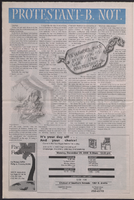Search the Special Collections and Archives Portal
Search Results

Interview with Bruce Walter Church, April 27, 2004
Date
Archival Collection
Description
Access note: May not quote in any form without written permission from interviewee
Text
Eric Brown (Washoe, County Manager) oral history interview conducted by Kelliann Beavers: transcript
Date
Archival Collection
Description
From the Lincy Institute "Perspectives from the COVID-19 Pandemic" Oral History Project (MS-01178) -- Government agency interviews file.
Text
Katherine A. Spilde Papers on Native American Gaming
Identifier
Abstract
The Katherine A. Spilde Papers on Native American Gaming include materials collected by anthropologist Katherine Spilde about Native American gaming and the greater gaming industry. The materials date from 1789 to 2015, with the bulk of materials dating from 1995 to 2010. Materials dating from the eighteenth and nineteenth centuries are reproductions of key court opinions and treaties concerning Native American rights and sovereignty. The majority of the materials document Native American gaming following the passage of the 1988 Indian Gaming Regulatory Act (IGRA). The papers detail Native American gaming enterprises both on and off reservations, the socioeconomic impact of gaming, and the legislative history of Native American gaming in the United States. The papers include research and subject files created by Dr. Spilde during her employment with the National Gambling Impact Study Commission (NGISC), the National Indian Gaming Association (NIGA), and the Harvard Project on American Indian Economic Development (HPAIED). The collection includes socioeconomic reports; testimonies; correspondence; memos; press releases; photographs; audiovisual materials; promotional materials from casinos and tourist attractions; brochures; fact sheets; summaries; booklets; pamphlets; advertisements; tourism materials; journal articles; legal briefs; legislative documents; court opinions; Dr. Spilde’s notes; presentations; packets, agenda, schedules, and itineraries from conferences; periodicals; Native American and community newspapers; and newspaper articles. The collection includes materials about over one hundred federally recognized Native American nations. Also included are materials that document the socioeconomic impact of gaming, the international gaming industry, criminal activities related to gaming, advertising about gaming and casinos, lotteries, internet gaming, compulsive gambling, and bankruptcy as a result of gambling.
Archival Collection
Union Pacific Railroad Collection
Identifier
Abstract
The Union Pacific Railroad Collection (1828-1986) is comprised of the original corporate records of the Union Pacific Railroad's operations in Southern Nevada, Utah, and Southern California, particularly focusing on Las Vegas and Los Angeles. The collection documents the purchase of Stewart ranch and the construction of the original depot and town which became modern Las Vegas. The collection also contains the records of the Las Vegas Land & Water Company (LVL&W), a subsidiary of the railroad formed in 1905 to handle the railroad's land transactions. The collection contains office files, correspondence, reports, leases, various legal, governmental and financial document, the collection contains large and small format maps, architectural and engineering drawings, published technical reports, railroad operational manuals, bound legal briefs, ledgers, and payroll and receipt books. The collection also includes the personal files of Walter Bracken, the Union Pacific's special representative in Nevada and vice president of the Las Vegas Land and Water Company, and a paper index of the collection materials.
Archival Collection

Sergio "Checko" Salgado oral history interview: transcript
Date
Archival Collection
Description
Oral history interview with Sergio "Checko" Salgado conducted by Laurents Bañuelos-Benitez, Barbara Tabach, Elsa Lopez, and Monserrath Hernández on June 4, 2019 for the Latinx Voices of Southern Nevada Oral History Project. Checko talks about his personal history that led him to pursue journalism and photography. He discusses his education and employment working in art galleries in Denver, Colorado and Las Vegas, Nevada and the various art exhibitions he has designed including in the Marjorie Barrick Museum at the University of Nevada, Las Vegas and in the Reynolds Senate Building in Washington, D.C.
Text

Meli Calvo Pulido oral history interview: transcript
Date
Archival Collection
Description
Oral history interview with Meli Calvo Pulido conducted by Laurents Banuelos on November 13, 2018 for the Latinx Voices of Southern Nevada Oral History Project. In this interview, Pulido discusses her early life in Tijuana, Mexico and moving to Las Vegas, Nevada in the mid-1970s. She talks about the challenges she faced as an English as a Second Language (ESL) student, and assisting her parents who did not speak English fluently. Lastly, Pulido describes volunteering for the non-profit organization Project 150, the work the organization does for homeless youth in Las Vegas, and assisting underprivileged students.
Text
Selena Torres (Nevada Legislature, Assemblywoman) oral history interview conducted by Magdalena Martinez: transcript
Date
Archival Collection
Description
From the Lincy Institute "Perspectives from the COVID-19 Pandemic" Oral History Project (MS-01178) -- Elected official interviews file.
Text

Amy Bush Herzer oral history interview: transcript
Date
Archival Collection
Description
Oral history interview with Amy Bush Herzer conducted by Barbara Tabach on November 14, 2019 for the Remembering 1 October Oral History Project. Herzer begins the interview discussing her early life, education, and her current job as the University of Nevada, Las Vegas (UNLV) women's golf coach. She speaks about her family's history with golf, her personal history, and life with her husband, Kendall Herzer. After, she recalls where she was on the day of the October 1 shooting, and how she found out about the event, and recalls her husband reported to the main fire station as an Emergency Manager for the State of Nevada. She recalls keeping track of her athletes' whereabouts and letting their families know. Herzer describes how people reacted when she had brought a therapy dog, Apollo, in for the people donating blood and how the community came together to support each other and share resources as a community.
Text


